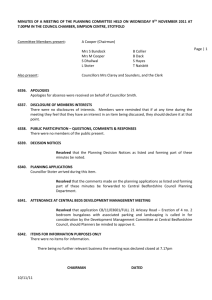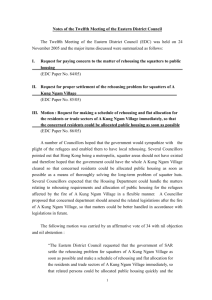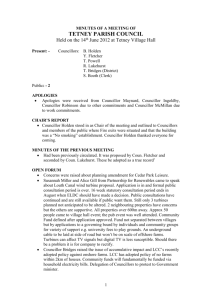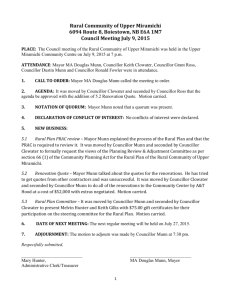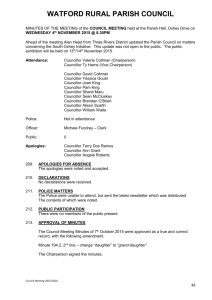Position Paper Local Government Amendment (Governance and
advertisement
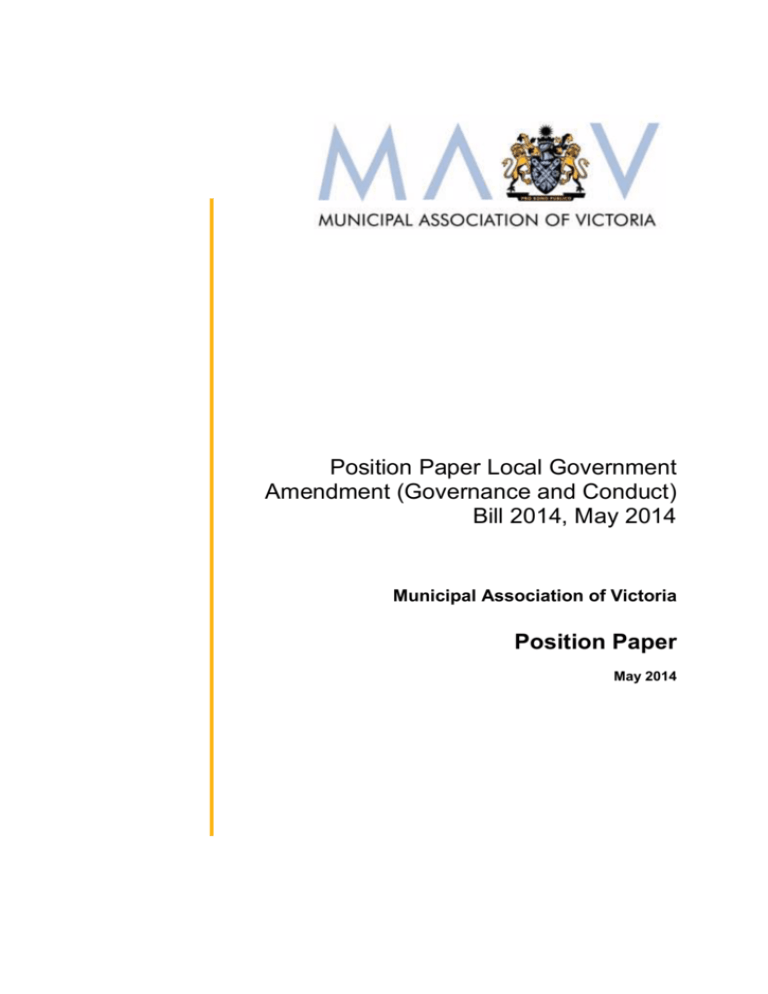
Position Paper Local Government Amendment (Governance and Conduct) Bill 2014, May 2014 Municipal Association of Victoria Position Paper May 2014 6 Table of contents 1 Introduction ............................................................................................................... 2 2 Role of Councillor ..................................................................................................... 3 3 Chief Executive Officer Employment Matters Committee (CEOEMC) ....................... 6 4 Minister’s Governance Direction Power .................................................................... 3 5 Councillor Conduct constituting misbehaviour at meetings........................................ 8 7 Oath of Office.......................................................................................................... 11 8 Councillor Induction ................................................................................................ 12 9 Councillor Conduct / Councillor Code of Conduct / Internal Resolution Procedure of Council.................................................................................................................. 8 1 Introduction The Local Government Amendment (Governance and Conduct) Bill 2014 was introduced in April 2014 and second read on 2 April 2014. The stated purpose of the Bill is to: enhance the understanding of Councillors in relation to the standard of conduct expected of Councillors by further Council processes and policies enhance Councils governance standards provide for the appointment of the Chief Municipal Inspector and municipal monitors provide for internal processes for the resolution of allegations of Councillor misbehaviour. The Bill provides for significant changes to governance processes within Councils with limited consultation, if any, regarding the catalyst for the proposed legislative changes nor the potential solutions to local government governance problems perceived by the State. The State’s June 2013 Councillor Conduct and Governance reform discussion paper (CCGRDP) provided important contextual information regarding Councillor Conduct principles and mechanisms and the role of the Mayor and the conduct of meetings. In many cases, it did not identify the ‘solutions’ we now see incorporated in the Bill. As a consequence of the State not engaging in a second, more detailed consultation, which may have enabled the resolution of many of the problems resulting from the Bill, the local government sector has a very short timeframe within which to make representations for change to the Bill, which has already been second read. There are matters included in the Bill that are welcome despite those matters not being included in the CCGRDP. The proposed constraints in relation to ward discretionary funds may provide clarity and improved transparency. Providing a legislative basis for the Chief Municipal Inspector and municipal monitors is also welcomed. These positions need to be properly differentiated from the existing provisions relating to inspectors of municipal administration, with appropriate protocols developed to ensure that there is clarity both about the purpose of the position and the manner in which the position will function. However, many changes impact the autonomy of Councils, increase the administrative burden and add to the costs of a Council without any proper consultation regarding the ‘issue’ and alternative solutions, let alone any cost/benefit analyses. The level of consultation with local government is particularly disappointing in the context of the dialogue around the Victorian-State Local Government Agreement. Councils will now need to pay for arbiters, as well as mediators and the cost of Councillor Conduct Panels; an independent Chair of an advisory committee in addition to expert consultants. When the Inspectorate lodges a Conduct application the Council must pay the costs of the Panel, when the State appoints a municipal monitor, the fees payable to the monitor are determined by the State but payable by the Council. Finally, we understand that the State will work with MAV and consult with the local government sector on the guidance that is necessary for implementation. We call on the State to provide a draft schedule of proposed guidance together with a proposed 2 Position Paper Local Government Amendment (Governance and Conduct) Bill 2014, May 2014: May, 2014 timetable and consultation process noting that the draft would be amended to reflect the final form of the Act. 2 Minister’s Governance Direction Power The Bill provides that the Minister may direct the Council to amend, discontinue or replace governance processes and policies if either the Chief Municipal Inspector or a municipal monitor advises the Minister that the processes or policies require improvement and the Minister is satisfied that the processes and policies require improvement. 2.1 Councillor Conduct & Governance Reform discussion paper No issues relating to the potential for Ministerial Governance Directions were raised in the CCGRDP. 2.2 Comment The proposed Ministerial power is very broad and should be restricted to those instances where governance processes are demonstrated to be grossly inadequate or in breach of the Local Government Act 1989. Most processes and policies can be improved and the purpose of regular reviews of processes and policies is to ensure that they address contemporary issues as efficiently and effectively as possible, within appropriate resource constraints. Governance processes and policies apply to all forms of decision making by a Council. Councils are concerned at the prospect of this power being used to constrain them from taking action which is consistent with the expectations of their community but at odds with a State Government position. The Constitution recognises local government as a distinct and essential tier of government consisting of democratically elected Councils. It is that independence that allows Councils to properly represent their communities Powers of this type may need be used in the rare and extraordinary where a Council fails to take appropriate action to remedy a deficiency in a governance process however the proposed wording is far too broad and raises the possibility of the use of the power for a political end. Any power of this nature should be subject to appropriate standards, including procedural fairness, and exercised only after an objective assessment against those standards. The power should be narrowed to relate only to ‘processes’ as to minimise the prospect of the State overriding local government when so is advocating on behalf of the communities they represent. 3 Position Paper Local Government Amendment (Governance and Conduct) Bill 2014, May 2014: May, 2014 3 Role of Councillor The Bill provides that the role of a Councillor is to participate in the decision-making of the Council; & to represent the local community in that decision-making. It further provides that in performing the role of a Councillor, a Councillor must consider the diversity of interests and needs of the local community observe the principles of good governance contribute to the strategic direction of the Council provide civic leadership in relation to the exercise of various functions & responsibilities of the Council under this Act and other Acts participate in the responsible allocation of resources of Council through the annual budget facilitate effective communication between the Council & the community. Finally, this section specifically provides that a role of a Councillor does not include the functions that are specified as functions of the CEO. 3.1 Councillor Conduct & Governance reform discussion paper The CCGRDP makes the point that there is little about the role of a Councillor in the Act. It suggests that information about the particular problems that arise where Councillors inappropriately involve themselves in operational matters rather than high-level strategic priority setting and planning may be addressed by training or guidance material. The CCGRDP asks whether ‘the role of Councillors should be set out in the code of conduct principles in the Act’. 3.2 Comment The Councillor role statement is of fundamental importance. It is one of two mandated requirements for the induction that a Councillor must complete before being able to take the oath of office and participate in decision-making. It is of critical importance that the new provision accurately reflects the role of a Councillor and neither creates confusion for Councillors nor for the communities they represent. . Administrative decision / Policy decisions While we agree that the primary role of a Councillor is to participate in Council decision-making we have grave concerns regarding the second part of the provision, which requires a Councillor to represent the local community in Council decision making. This requirement is entirely appropriate in respect to ‘policy’ decisions that a Councillor contributes to, including the strategic direction setting of the Council through the Council Plan and other strategic documents, the Council budget and the Council’s consultation framework. The second part of the proposed provision relating to the role of a Councillor does not properly reflect the role of a Councillor in administrative decision-making. Administrative decisions are those that ‘affect the legitimate rights and entitlements of a person’ where there is a common law obligation on decision makers, and those that contribute to decisions, to make those decisions on the basis of relevant considerations in accordance with the principles of natural justice. Planning scheme amendments, planning applications, permits under local laws are all examples of administrative decisions. 4 Position Paper Local Government Amendment (Governance and Conduct) Bill 2014, May 2014: May, 2014 When a Councillors is considering ‘administrative decisions’, including planning decisions, their role is to apply the relevant statutory framework. Applicants are entitled to expect that the relevant framework will be applied by individual Councillors in decision-making and that irrelevant considerations will not affect that decisionmaking. Where a Councillor is dissatisfied with the application of an element of the framework then the role of the Councillor is to advocate for change to that element. Their role is not to represent the local community if by doing so that means taking into account ‘irrelevant considerations.’ Accordingly, this part of the ‘role’ definition requires amending so as to ensure it is expressed with clarity. The inclusion of ‘policy’ before ‘decision-making’ would go some way to achieving clarity subject to the inclusion of a specific description of the administrative decision making role. Such amendments would assist Councils and individual Councillors understand the differing requirements that apply to ‘policy’ and ‘administrative’ decisions. Inconsistency with Charter & Oath The Local Government Act 1989 provides, at section 3, in the Local Government Charter, under ‘What is the Role of a Council?’ that the Council is elected to provide leadership for the good governance of the municipal district and the local community. The proposed Councillor role description only picks up part of this role. The oath of Office requires that Councillors undertake the duties of office in the best interests of the people in the municipal district. The role statement requires a Councillor represent the local community in decision making. How is this to be reconciled? The description of the role may also suggest that a councillor has a greater role in relation to their ward or the stakeholders, which again is contrary to the duty of the Councillor as expressed in the oath. Requirement to vote In supporting the first element of the proposed description of the role of a Councillor – that of participating in Council decision making – it is noted that in 2012 amendments to the Local Government Act removed the obligation on a Councillor to vote. Indemnity Additionally, how does the ‘role’ provision fit with the indemnity constraint that covers Councillors ‘exercising any function or power on behalf of a Council.’ If, as it appears, there is a disconnect between the two, what is the rationale for not indemnifying Councillors who find themselves the subject of a claim or action as a result of performing their role? 5 Position Paper Local Government Amendment (Governance and Conduct) Bill 2014, May 2014: May, 2014 4 Chief Executive Officer Employment Matters Committee (CEOEMC) The Bill requires the establishment of an advisory committee, the CEOEMC, comprising a Chair and at least two Councillors. The Chair must not be a Councillor or member of Council staff and must be suitably ‘qualified’. A Council may only pay a fee to the Chair. The functions and responsibilities of the CEOEMC are to make recommendations to Council on contractual matters relating to a CEO or A/CEO – appointments, remuneration, conditions of appointment, reappointments conduct performance reviews of the CEO to perform any other prescribed role. 4.1 Councillor Conduct & Governance Reform discussion paper No issues relating to the manner in which Councils address CEO employment matters were raised in the CCGRDP. 4.2 Comments This provision is particularly troubling to the sector. Councillors consider the various CEO employment related decisions as some of the most important that the Council makes. Councils generally appoint appropriately skilled consultants to assist with the various matters including local government recruitment specialists, legal practitioners and individuals skilled in assisting in both the preparation of performance criteria and the evaluation of CEO performance. The additional costs and the tensions that may arise with more than one ‘expert’ in play are of concern to Councillors. The provision does not take into account the contractual obligations that exist in current CEO employment contracts. The majority of CEO employment contracts provide for the composition of a performance review committee that is generally advisory to Council. How are these contractual obligations to be reconciled with the new provisions? Is the fee paid to the ‘suitably qualified’ Chair intended to recompense the Chair for any professional advice that he/she may provide to the council on, say, terms and conditions of employment? If not, is the Chair also able to provide advice, for an additional fee, to the Council or would this represent a conflict of interest? Why is the contractual matters responsibility clearly expressed to be advisory however, the committee conducts the performance review of the CEO? How is this an advisory function? Is the restraint in relation the Chair not being a Councillor or member of council staff intended to apply to all Councillors and members of Council staff or only the Councillors and council staff of the particular Council? How does the creation of a CEO Employment Matters Committee with an independent, paid, Chair impact one of the most critical relationships within the Council, that of the Mayor and the CEO? 6 Position Paper Local Government Amendment (Governance and Conduct) Bill 2014, May 2014: May, 2014 It is highly probable that the meetings of the Committee will be confidential meetings. If the Chair were to disclose any concerns he/she had in respect to recommendations by the Committee, the Chair may be in breach of confidentiality obligations that will, of necessity, be part of any terms of appointment. One option that may address any concerns that the State has regarding processes relating to CEO employment matters is to require that Councils consider appropriate benchmarking information on remuneration, employment contracts, recruitment, reappointment and performance review matters. 7 Position Paper Local Government Amendment (Governance and Conduct) Bill 2014, May 2014: May, 2014 5 Councillor Conduct constituting misbehaviour at meetings The Bill provides for a series of warnings by a Mayor, at Council meetings & where the Mayor chairs special committee meetings or an assembly of Councillors. 5.1 Councillor Conduct & Governance Reform discussion paper The ejection of unruly Councillors and the powers of Mayors is referenced in the Discussion Paper. The Paper, however, describes a process whereby the Mayor could be given a limited power, such as to move a motion that a Councillor be required to leave the meeting for a specified time. 5.2 Comment Concern has been expressed regarding both the potential abuse of this power by a mayor and the Conduct Panel processes that relate to the process and there are mixed views as to the means by which these concerns could be resolved. The proposed amendments provide that a Councillor who believes the Mayor misused the power to warn or to eject him/her can bring an application for serious misconduct against the Mayor. The failure of a Councillor to comply with a request of the Mayor to leave the meeting of a Council is also included in the definition of serious misconduct and could be the subject of an application to a Councillor Conduct Panel. In order to mitigate against the abuse of the power by a Mayor it would be possible to provide that the Council has the power to override any exercise of the mayor’s power to warn. If the section was amended to reflect that the Council has the ultimate power in respect to meeting conduct warnings then the Mayor’s exercise of the power would no longer need to potentially be the subject of an review by a Conduct Panel because it has been ‘accepted’ as appropriate by the Council. Alternatively, the Chair (Mayor) could put a motion regarding an intended ‘warning’ to the Council and the warning would only be made if the motion was passed. The common element of the proposed alternatives is that a warning should only occur where it has the majority support of the Council. 8 Position Paper Local Government Amendment (Governance and Conduct) Bill 2014, May 2014: May, 2014 6 Councillor Conduct / Councillor Code of Conduct / Internal Resolution Procedure of Council 6.1 Councillor Conduct & Governance reform discussion paper Much of the CCGRDP relates to these matters however, the provisions in the Bill are rarely described in detail in the Paper. 6.2 Bullying The Bill inserts a definition of ‘Bullying’ that differs from the WorkSafe definition– bullying by a Councillor means the Councillor repeatedly behaves unreasonably towards another Councillors or member of Council staff and that behaviour creates a risk to the health and safety of that Councillor or member of Council staff. ‘Serious misconduct’ is amended to include additional matters including bullying by a Councillor. 6.3 Comment One of the additional functions of the CEO is the responsibility for managing interactions between Council staff and Councillors including by ensuring that appropriate policies, practices and protocols are in place defining appropriate arrangements for interaction between Council staff and Councillors. No Councillor should become aware that he or she is alleged to have repeatedly behaved unreasonably towards other Councillors or council staff without having had that conduct brought to his/her attention in a timely manner . Any conduct that is ‘unreasonable’ and that may create a risk to health and safety should be brought to the attention of the relevant Councillor as soon as practicable and this requirement should be incorporated in both the Councillor/ Staff policies and the Councillor/Councillor policies. Early and appropriate attention to inappropriate conduct is the best means of avoiding bullying claims and provides the Councillor with an opportunity to change behaviours or respond to unfounded allegations in a timely manner. Procedural fairness is essential. The WorkSafe definition of bullying changed in 2012 to ‘persistent and repeated negative behaviour directed at an employee that creates a risk to health and safety.’ Changes in terminology have far-reaching impacts. Guidance material that relates specifically to the definition included in the Bill will need to be developed for local government given that the local government definition does not require ‘persistent’ or ‘negative’ behaviour. 6.4 Internal Resolution Procedure The Bill includes a requirement that the Internal Resolution Procedure provide for the selection of an arbiter including a requirement that the arbiter consider applications alleging a contravention of the Code of Conduct by a Councillor. The arbiter must make finding in relation to any application, ensure parties affected by an application have the opportunity to be heard and provide written reasons to the Council and the Councillor against whom the allegations were made. 6.5 Comment Anecdotal evidence to date suggests that the more ‘mechanical’ and public a ‘resolution’ process, the less likely it is to result in improved relationships between the Councillor alleging the breach of the Code of Conduct and the Councillor who is the subject of the complaint. The process stipulated by the Bill means that once the 9 Position Paper Local Government Amendment (Governance and Conduct) Bill 2014, May 2014: May, 2014 breach is the subject of an application, an arbiter must report findings on that matter to Council and the Councillor who is the subject of the complaint. There is at least a possibility, if not a likelihood, that those findings will find their way into the public domain. It is highly desirable that a Council provide in the Code a pre-application process that allows such matters to be mediated or the subject of a facilitated discussion, which can remain confidential to the parties. 6.6 Sanctions for contravention of Councillor Code of Conduct The Bill provides that once an arbiter finds that a Councillor has contravened the Code of Conduct the Council may, in writing, direct the Council to apologise is a specified form or manner, direct the Councillor to not attend up to 2 meetings of the Council; direct that for a period of up to 2 months the Councillor be removed from any representative position and does not chair or attend committee, assembly and other meetings specified in the direction. 6.7 Comment Although the arbiter is required to ensure that parties affected by the application have an opportunity to be heard it may be that the Councillor has legitimate concerns regarding the process used by the arbiter or the conduct of other parties. If a Councillor, the subject of a complaint, believes that the findings of the arbiter are not supported by evidence or otherwise misconceived, what is his or her remedy? There are no constraints on the majority of Councillors applying the most severe, or all, of the sanctions available to the Council against a Councillor for reasons other than the breach of the code of conduct. The current process, which provides for internal dispute resolution with an opportunity for matters to escalate to a Councillor Conduct Panel, with the potential for review by VCAT, is considered to be a fairer model that provides better safeguards for procedural fairness and appropriate sanctions. What are the other consequences that may flow from a Council imposing sanctions on a Councillor after considering recommendations by an arbiter? Is this a matter that would be considered to be a professional disciplinary matter of the type required to be disclosed in a passport application and in other formal processes? 10 Position Paper Local Government Amendment (Governance and Conduct) Bill 2014, May 2014: May, 2014 7 Oath of Office The Bill provides for the oath to include additional words to reflect that in undertaking the duties of a Councillor, Councillors will at all times act impartially, with integrity and in accordance with the Councillor conduct principles; & treat fellow Councillors, Council staff and members of the community with dignity and respect. It also The Bill also provide for the Chairperson (Mayor) to recite the Oath at the commencement of each Council meeting. 7.1 Councillor Conduct & Governance Reform discussion paper The CCGRDP seeks advice on whether the conduct principles are understood by Councillors and council staff. No reference is made to proposed changes to the oath nor the reciting of the oath prior to meetings. 7.2 Comment Mayors and Councillors have responded positively to the additional parts to the oath of office and very little concern has been expressed regarding the recitation of the oath of office at the commencement of the meeting. Possible issues include; The Mayor is required to recite the specified Oath of Office. The provision should be amended to provide ‘read’ rather than ‘recite’ given the meaning of ‘recite’ includes an element of repeating from memory. The Mayor should be able to substitute ‘we’ for ‘I’ in the Oath so that it is clear that he/she is making a collective statement on behalf of all Councillors. The requirement for the reciting of the Oath at the commencement of each Council meeting will pre-date the change to the Oath of Office made by each Councillor. Should the recitation requirement only commence once it reflects the Oath of Office taken by Councillors? What is the impact if a Mayor fails to recite the Oath at the commencement of each Council Meeting? Would a Mayor who fails to recite the oath as stipulated be in breach of the Councillor Conduct Principles and at risk of sanctions as a consequence? 11 Position Paper Local Government Amendment (Governance and Conduct) Bill 2014, May 2014: May, 2014 8 Councillor Induction The Bill provides that persons elected to be Councillors must complete a Councillor induction program arranged by the CEO. The induction program must be arranged within two weeks after the declaration of election of the person. If the Councillor-elect is unable to takes the induction program at the time arranged by the CEO, another program must be arranged by the CEO to be available to the Councillor-elect. The induction program must only contain information relating to the role of a Councillor, the Councillor conduct principles and other prescribed matters. The Councillor–elect must make a written declaration, witnessed by the CEO, stating that they have completed the program. The oath of office must not be taken until a Councillor has completed the induction program. 8.1 Councillor Conduct & Governance reform discussion paper The CCGRDP canvasses the potential for training on the role of Councillors being mandated for all new Councillors (our emphasis) in considering the prevention of conduct and behaviour issues. 8.2 Comment The mandatory induction is supported subject to the resolution of the practical issue around timing. The Oath of Office should occur first, with the induction required to occur within 4 weeks of taking the Oath. Concern has been expressed at the inevitably longer period that the Council will be without Councillors. The VEC is unable to provide commitments regarding the timing of the declaration of election/s and the necessity of ensuring that the vast majority of Councillors–elect undertake the induction program after the declaration may mean that programs occur quite late in the two-week period available to the CEO. This, in turn, will result in a delay between the election and the commencement of council meetings at a time where Councils have been constrained by the caretaker requirements and where a Council decisions are desirable. The deferral of the taking of an oath of office until after the completion of the induction program may diminish the celebratory aspect that many ‘swearing in ceremonies’ have had in the past. An allied issue is that the ‘swearing in ceremony’ in the past has been an early opportunity for Councillors to express their support for their new colleagues. 12 Position Paper Local Government Amendment (Governance and Conduct) Bill 2014, May 2014: May, 2014
